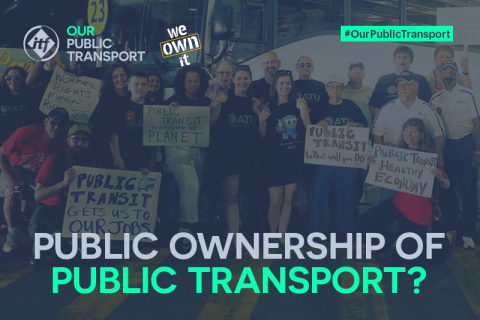
28 November 2017
Do you care about public transport? Do you work in public transport?
We're creating a global policy for how we can own our trains, buses, trams and so on – and we'd love you to be part of it.
We're teaming up with the ITF’s Our Public Transport programme to create a policy for publicly owned public transport, and a toolkit showing how we can get there.
Our Public Transport is a programme by the International Transport Workers’ Federation, which represents transport workers across the world.
Together, with passengers and workers side by side, we can create an alliance for public transport that belongs to all of us.
We can show
-
how much support there is for public ownership of transport across different countries, and what people believe about why we should own it
-
what public ownership should look like – including different models and successful case studies
-
which campaigns and initiatives have succeeded in bringing transport into public ownership, or protecting it from privatisation – and why
Solidarity and sharing our experiences can help us bring trains, buses and trams into public ownership across the world.
You can give your thoughts in two ways:
-
Comment below. Tell us about the impact of privatisation or publicly owned transport in your life. Tell us why you care and what you want to happen.
-
Fill in our survey. This asks for more of your feedback. It includes questions for campaigners, passenger groups and unions about case studies of different models of public ownership and successful efforts to get us there.
Share your story below or fill in the survey here.
Thank you for being part of this – stay tuned on our website to see how it develops, and follow #ourpublictransport on Twitter.







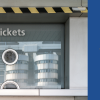


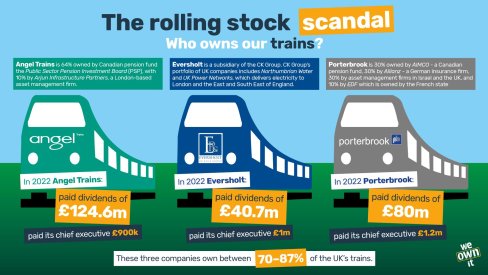
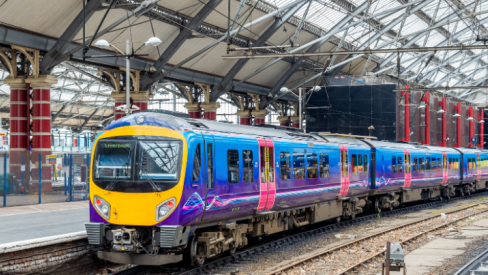
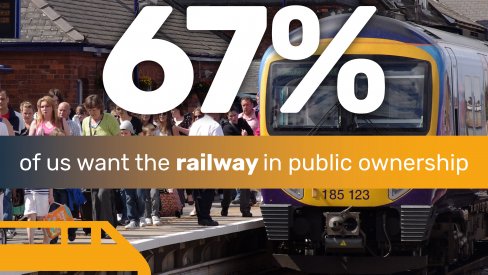
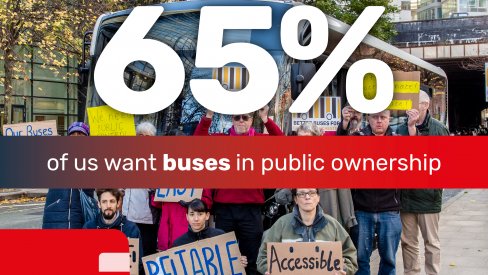
Comments
Celia Moore replied on Permalink
Public transport will only be successful if you have a government who supports public transport instead of setting it up to fail, by underfunding it. Just like all our other public assets. That's why we need legal input into the protection of publicly owned assets. It should be illegal for any political party to sell off what belongs to the public. We need an act passed as soon as possible. Anybody that has any business acumen will know that you need an integrated marketing strategy when providing a service to the local community. A strategy that is responsive to the demographic, and needs of the local region, as well as having the ability to anticipate trends, and sharing ideas with residents, local businesses and local attractions in terms of special deals and discounts for those using public transport. It's not rocket science.
Vincent Menge O... replied on Permalink
The transport sector is characterised by lack of observation of traffic regulations,
resulting in a large number of fatal road accidents and serious injuries.
There were times when we could not figure out whether public transport was a blessing or a curse.
Passengers were mistreated at will across the country. They were verbally abused and physically assaulted.
Theft, hijacking, sexual harassment, beatings were rampant.
But today, thanks to the efforts the stakeholders, especially the vehicle owners and the government, policy measures have been put in place to make Public Service Vehicles (PSV) a sober industry that woos many investors yearly. PSV operators are now required to join independent, Government-registered transport companies or Savings and Credit Co-operatives (Saccos). We now have a vibrant MATATU WORKERS UNION (MWU), which imposes checks and balances on its members.
These associations have not developed terms of service and codes of conduct for their owners and workers and now they are not transforming the industry in its entirety.
PSVs are now not fitted with seatbelts and speed governors. In 2004, a phenomenal transformation swept the country. The then Transport and Communications minister, the late John Michuki, single-handedly restored sanity in Kenya’s troubled public transport sector through the so-called Michuki rules. All PSVs were to operate on clearly de?ned routes under Saccos, carry a speci?ed number of passengers and matatu crew were required to have a clean security record. Fatalities reduced significantly. Disrespect, which could lead to a jail term, saw matatu crew embrace discipline. In addition, carrying excess passengers was banned. The implementation of the regulations led to a drastic reduction in the number of people killed or injured in road accidents. Notably, most Saccos have not deployed digital tracking and fleet management systems to support business operations and prevent criminal activity. Matatu workers Union is confident that a bold new era of cashless fare payment system (using a card to pay fares) would improve efficiency.
Noteworthy, the National Transport and Safety Authority (NTSA) has a rule that slaps a blanket suspension on all public service vehicles attached to a Sacco when one of them commits a traffic offence. This is geared towards ensuring matatu Sacco’s and all their staff comply with traffic rules. My Union has made a welcoming proposal to have drivers and conductors paid regular salaries. This proposal is aimed at ensuring PSV drivers and conductors get standard salaries to enable them pay income taxes and also contribute to the National Social Security Fund and the National Hospital Insurance Fund.
Miss Glenys Mar... replied on Permalink
Public transport is a need, not a want. Just like water, gas, electricity and health. So not suitable for private profit.
ISAAC MAITHYA replied on Permalink
Good survey
Abigael Kidweye... replied on Permalink
i think we need more public transport in our country ...without this we shall have no more movement ....how will the workers commute to work or student going yo schol?another thing if u compare public nd private in terms of fare isn't the same........we ned to levalised things
Candida Spillard replied on Permalink
East Coast Rail under public ownership was a pleasure to board, never got me to London late and apparently resulted in a healthy income to HM Treasury.
I genuinely don't know why it was re-privatised.
It should be back in public ownership.
Joseph Ndiritu replied on Permalink
Passenger transport in Kenya is dominated by investors who are capitalists that put profit before service. I support this campaign that will change ownership of public transport in Kenya, a public transport that recognizes the needs of passengers and rights of workers.
Add new comment